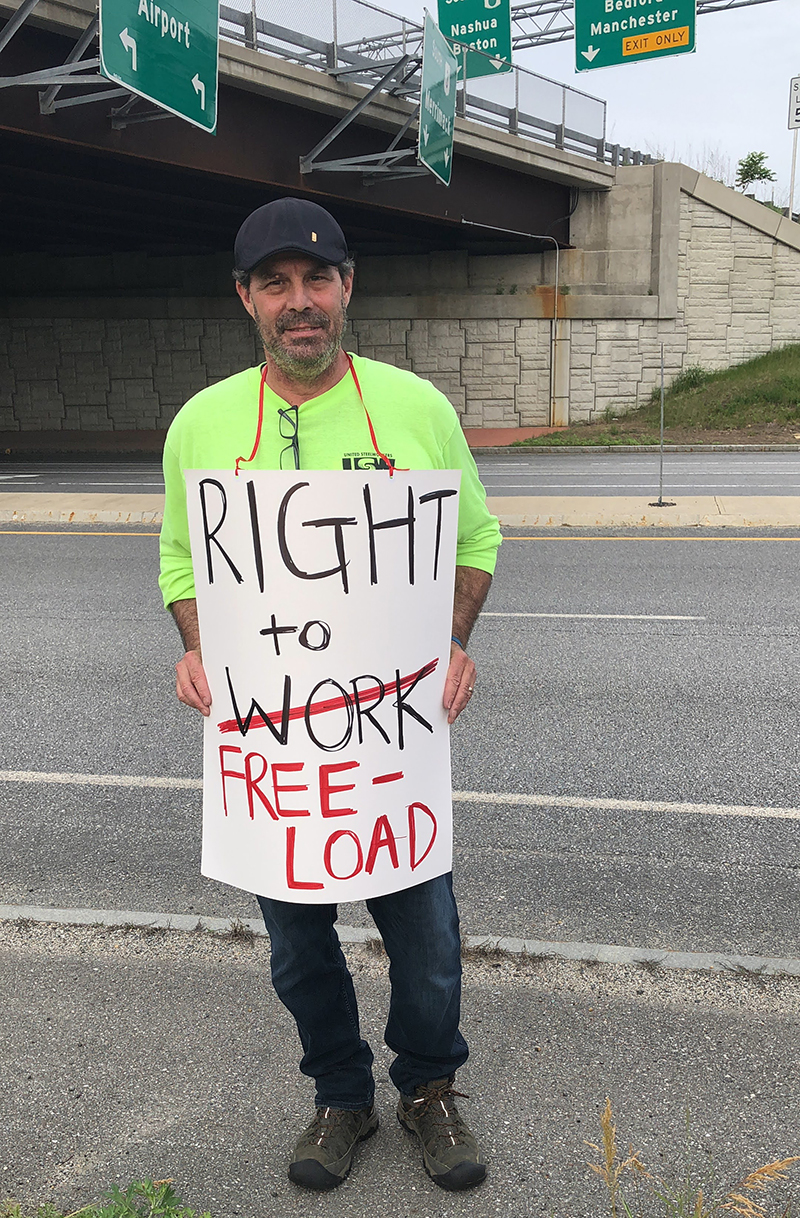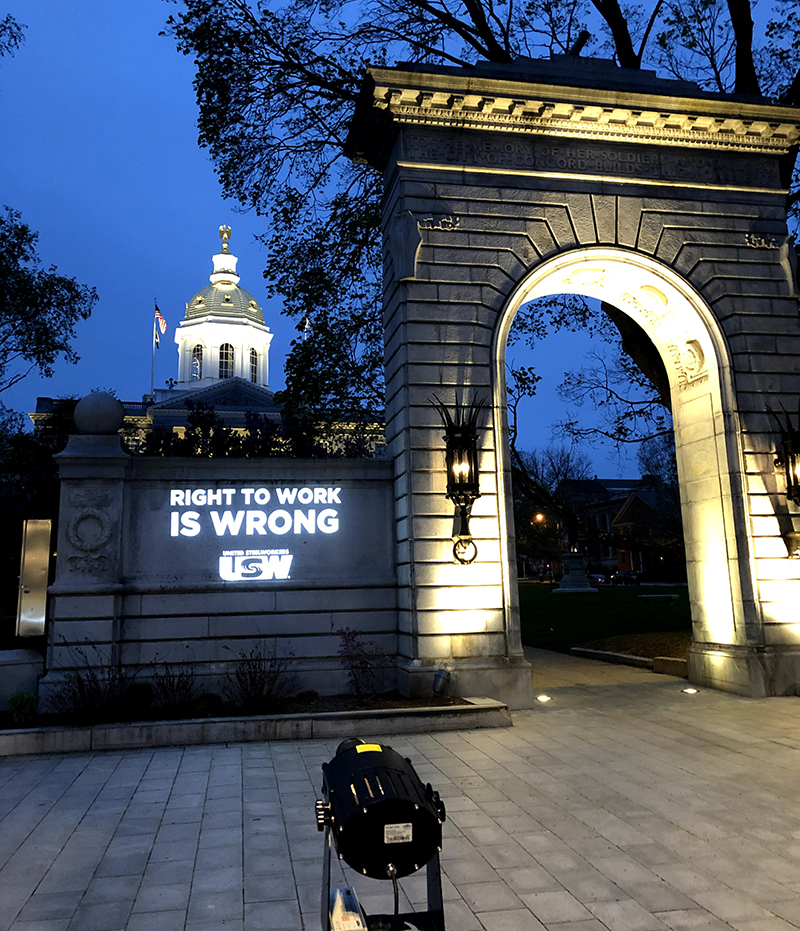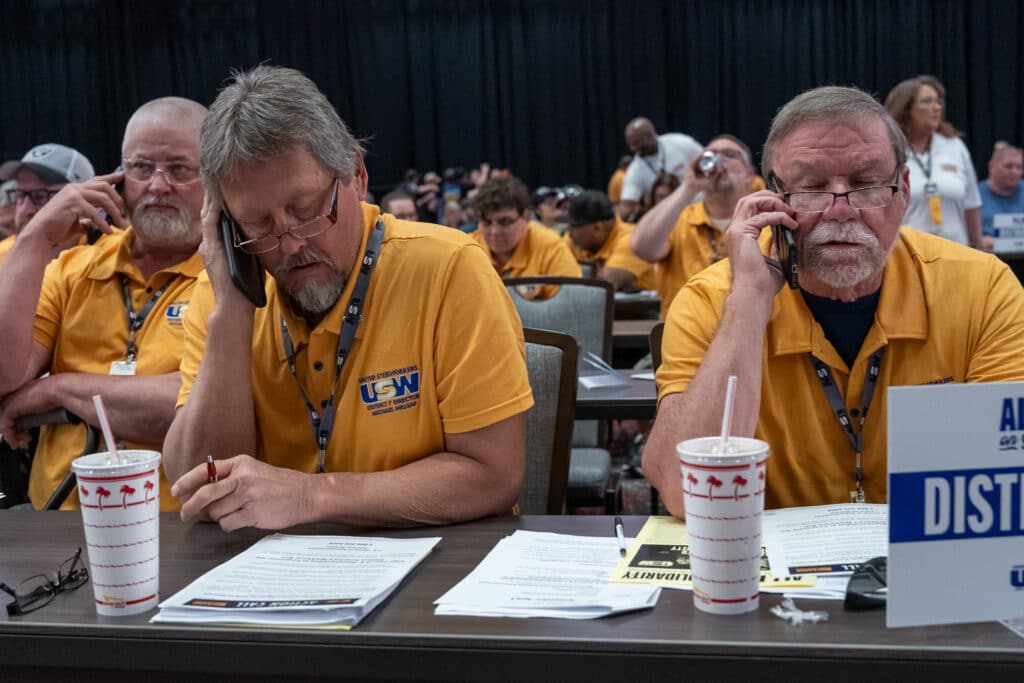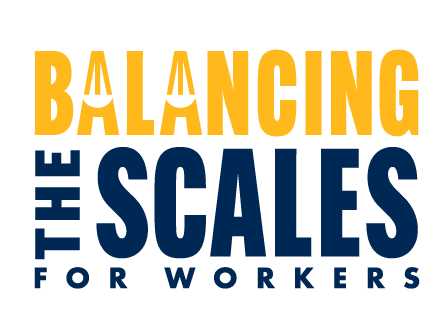Rapid Response Coordinator Spotlight: Dave Dellisola, USW Local 12012
As we enter a season of giving thanks, your USW Rapid Response Program wants to take a minute to say THANK YOU! We know that our program would not be successful without each and every one of you. Your tireless work and dedication to ensuring that workers voices are heard at every level of our government helps lead the way to equity and justice for all working people, not just those at the top.
What better way to show our gratitude for all of the powerful work our activists do, than lifting up their stories and shining a light on their successes?
Last week, I spent a little time catching up with Dave Dellisola. He is USW Local 12012’s Rapid Response Coordinator and Vice President, and this month’s Rapid Response Spotlight:
How did you get involved in Rapid Response?
In 2009 or 2010 as we began preparing for our contract negotiations at National Grid, we started to familiarize ourselves with the International’s resources. We really weren’t using them too much before that. We were like a lot of locals and felt like we were on our own. We didn’t think there was help out there and didn’t ask for it. But, when National Grid bought up Boston Gas and Keyspan and became one of the big boys, we realized that we needed to get all of the knowledge we could and come up with a strategy to fight them come contract time.
Like all companies we knew that they were going to go for a two-tiered system and come after us for all they could. I may have gotten “voluntold” at the beginning, but I learned the ropes and realized how important the International’s programs like Building Power and Rapid Response really are, and I’ve been involved in the program ever since.

You mentioned you got involved while preparing for contract negotiations. As many people know, your local was locked out by National Grid for around seven months a few years ago. What role do you think Rapid Response plays when it comes to your contract and negotiations?
Depending on the industry you are in, it can play a big part in gaining leverage. For instance, we at National Grid work with natural gas and are a public utility, so a lot of the decisions that are made regarding our work come from the Department of Public Utilities and the Governor. We are really fortunate in Massachusetts because our politicians here are very worker friendly, but you have to stay on them about what you need. One of the big things that we were able to use for leverage during our lockout, was when we were able to lobby our politicians and the Governor to pass legislation that extended the unemployment benefits of the workers affected by the lockout. It was shortly after that the company came back to the table and we were able to get an agreement.
It’s the legislation in between that you have to watch as well. Like right now it’s mandated that we have to go into people’s houses and check the gas meters every seven years, but we are currently fighting off legislation that would change that mandate to every 12 years. That’s a lot of work for us, so we have to stay on top of them and make sure that we are doing our part to keep our members working. We have to make sure we take our seat at the table. If you think about how environmental laws are changing, in our industry it’s imperative that we are at the table on these issues. We need to look out for the workers in fields like mine as we move toward green energy. The relationships that we build with our legislators through Rapid Response help to make sure that we always have that seat at the table. In fact, because of those relationships a lot of times legislators will call us when it comes to different bills and safety measures for the gas industry now.
I was told that you are a new District 4 Rapid Response Area Coordinator, and that you took a lead role for the District in the “Right to Work” fight in New Hampshire earlier this year. Can you tell me a little bit about that experience?
Well, I had previously spent some time with the Strategic Campaigns department going out into some of the Midwest states that have “Right to Work”; it really opened my eyes to how good we have it. I actually think that’s part of the reason they sent me to some of those places, they knew I was spoiled in Massachusetts. It was really hard for me to conceive how some of the locals in “Right to Work” states functioned. I just couldn’t understand it at first, but it didn’t take long for me to figure it out that it was not good. That is why I really had a heads up when it came to what “Right to Work” would do to New Hampshire. You might not see it right away but laws like that really hurt the locals.

“Right to Work” seems to come up every year in New Hampshire and I have been involved before, but this time it was different; it seemed like they really had a chance to pass it. I know the strategy for them is to get it into the Northeast, and New Hampshire is the most conservative of the states up here, so it is always the target. My local is amalgamated and we have units in Massachusetts and New Hampshire. So right off the bat I knew that no matter how good I have it in Massachusetts, if “Right to Work” passes in New Hampshire it will affect us in Massachusetts too. That was a real driving force for me to put everything I had into keeping it out. I know that it’s going to keep coming back and they are going to keep trying. Their strategies change with the times, from things like it’s going to bring new businesses to its about protecting the rights of the workers, and every time we are going to have to go out and prove them wrong and keep fighting them off.
You said that this time it was different, and it seemed like they really had a chance to pass “Right to Work” in New Hampshire. What do you think made the difference and how do you think you were able to stop it in New Hampshire this time?
I would have to say educating the 20 Republicans that voted NO on it. A lot of the legislators that I talked to didn’t know anything about it. They basically fell for it, especially the newer ones. As soon as January 1 hit, and the new legislators came in, the leadership started right off the bat trying to push it through so they couldn’t get educated on what it really does. I think by us calling and emailing and just educating these new legislators it got enough of them to take a step back and realize what “Right to Work” really does. It was a really close vote and I really believe it was the education of these legislators on what it would mean for working people, that made the difference. I actually think that we need to keep educating them even when there isn’t a bill on the table. That way the next time this comes up, because we know it will, we won’t be starting from scratch, and it will make it easier. And, it doesn’t stop with educating the legislators. We need to continue to educate the public too. If the legislators who are voting on it don’t know the harm it causes, we know the general public doesn’t either. I think education all the way around, all the time, would make the fight a lot easier.
In that “Right to Work” fight Rapid Response tried out some new tactics, and we really used Twitter and social media to put pressure on lawmakers. Do you feel like this helped?
Absolutely. I really think that it helped. We saw the legislators that really wanted to be educated reach out to us. One of them asked us to call him and when I called the gentleman, he had no idea what “Right to Work” was and he really wanted to learn. So, I think calling them out on social media, if you do it the right way, is a big help in these fights. It gets the word out, and if you get the right message, it really makes a big difference.

So, switching gears a little bit, we know that Rapid Response has functioned a little different over the last year and a half as COVID really prevented those one-on-one conversations the program is built on, can you tell me what you did to overcome this?
Obviously, we were affected, and like most locals really lost those one-on-one conversations. For us however, since we were really using the resources available to us as a local, we already had good communication networks built. Through the building power program and the CAT teams that we have used over the years, we were really ahead of the game and set up for it. We have good email and text lists and our own website, so we were still able to get the word out. I really think that’s key. If you have the chance to get involved in building power, it can really stretch into everything your local does and help you accomplish whatever goals you have. We rely on our CAT teams to get the word out to the membership for contract negotiations to Rapid Response, and everything in between. With the lockout too, it really prepared us for not being able to have those conversations on the shop floor because we didn’t have a shop floor for 7 months. We had done this before.
It sounds like your local Rapid Response team functions especially well. If you were going to impart one piece of advice to a new Rapid Response Coordinator to help make their team successful what would it be?
Communication. Communication is key to Rapid Response. I try to stress that you have to start out early. Don’t wait for an issue or your contract to pop up. It takes years. You can’t do it over night. It has taken us a long time to get things set up and get everyone’s information and make sure we are all on the same page. Communication within the local is where it starts and once you get that set up it makes everything so much easier. You have to keep up with and it’s a lot of work, but communication is the key. Communication all day, every day makes the difference.
I think that is some very sound advice. Before I go, I would be remiss if I didn’t take an opportunity to talk about our latest win. As you know, the Infrastructure Investment and Jobs act was signed into law on Monday and our Union played a major role in that by communicating with our legislators through our We Supply America Campaign. Can you tell me what this bill will mean to the members in your local?
Being in the natural gas industry we know that typically the first thing that will be done when tearing up and replacing dilapidated roads is upgrading the outdated and old utility lines that run beneath them. This is especially needed in the Northeast where a lot of the gas lines are old and made of cast iron. Most of the time they won’t replace them because it would mean that they have to rip the street up. Now, with this bill passed, the hope is that if they are ripping the streets up, they will have to replace the old gas lines. Most people don’t realize that a lot of the emissions that come from natural gas are a result of old and leaking pipes. Upgrading these gas lines will create a lot of work for our members and help address emissions in our industry.
As I wrapped up with Dave, he reiterated how important it has been for his local to take advantage of all the resources the International has for members. He told me that he knows there are locals out there that may not know what is available to them. If you want to learn more about the programs and resources your Union provides, talk to your Staff Rep. and go to www.usw.org and check out the “Get Involved” and “For Members” tabs.
All of us in Rapid Response would like to wish you and yours a happy and safe Thanksgiving. We are truly thankful for you and the work you do every day.
By clicking Sign Up you're confirming that you agree with our Terms and Conditions.
Recent News Articles
Want to Learn More?
See how the USW is making a real difference in our communities and our workplaces.

